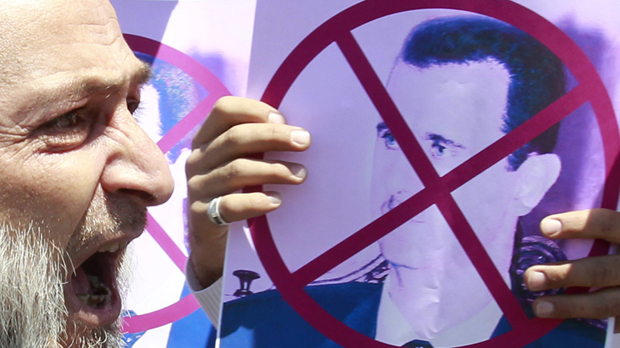Who runs Syria?
After weeks of protests and hundreds of deaths, who is in control of Syria? A UK-Arab journalist who’s spent time in Damascus writes for Channel 4 News on the real power brokers of a regime in crisis.

With his army laying siege to cities across Syria, and scores dying at the hands of the hated security forces, it seems a strange time for William Hague to call Syria’s President Assad a “reformer”.
A fortnight ago, Bashar Al-Assad spoke of the need for radical changes in the way Syria is run. He scrapped the “emergency law” (which allowed dissidents to be locked-up without trial), released political prisoners, and gave citizenship to the Kurds.
Days later his army was rolling into Daraa, the city where the uprising began. They closed roads leading to the town, cut off communications and shut the nearby border with Jordan.
These apparent contradictions between words and actions are down to the mosaic-like nature of the Syrian regime. It is not a cult of personality like Gaddafi‘s Libya, nor is it a money-making mafia regime like Ben Ali’s was in Tunisia. Syria is a coalition between diverse, and often divergent economic and military interests.
It is not a cult of personality like Gaddafi’s Libya, nor is it a money-making mafia regime like Ben Ali’s was in Tunisia.
Bashar Al-Assad sits atop these competing forces, trying to hold the regime together while struggling to assert his own agenda.
“The difficulty, one of the difficulties, in Syria is that President Assad’s power depends on a wide group of people in his own family and, of course, other members of his own government,” said the UK’s Foreign Secretary William Hague. “I am not sure how free he is to pursue a reform, even if he wanted to do so.”
A “dictatorship without a dictator” is how one diplomat described Syria.
Who are the real power-brokers?
So who are the power-brokers – Syria’s real rulers? The president’s brother, Maher Al-Assad, is Syria’s all-powerful security man. While Bashar pushed the argument for reform, promising concessions to the protestors, Maher took matters into his own hands, believing that only the military option could save the regime.
Maher is reportedly the target of planned US sanctions against those responsible for the death of pro-reform protestors in the country.
Under Maher’s direct command, the Syrian Army’s 4th Division led the charge into Daraa on Monday. There were rumours that other divisions tried to halt Maher’s private army taking control of the city, but to no avail.
The president’s brother, Maher Al-Assad, is Syria’s all-powerful security man.
Maher is said to be so out of control that he reportedly shot his brother-in-law Assef Shawkat in the stomach in the presidential palace in 1999. Shawkat is Maher’s greatest rival. He is the army’s deputy chief of staff, and the former head of the feared military intelligence.
Shawkat’s secret police kept tabs on huge swathes of the population, using a network of informants that could have rivalled the East German Stasi.
Dissidents were regularly dragged into jail on spurious charges and convicted by the Supreme State Security Court (which Bashar has just abolished).
Channel 4 News special report - Arab revolt: Middle East uprisings
While Maher and Shawkat are the men in control of Syria’s guns and jails, the real ire of the protestors is saved for Rami Makhlouf, a first cousin of the president.
Makhlouf’s role in Syria’s power-game is as the man who runs the country’s economy. He controls one of the country’s two mobile phone networks, Syriatel, as well as owning some of the most powerful companies, and taking a cut of many foreign investments. Makhlouf, one of the world’s richest men, is Syria’s Mr 10 per cent.
The US named him as a key figure in corruption in Syria, subjecting him to personal sanctions.
In 2008, the US named him as a key figure in corruption in Syria, subjecting him to personal sanctions.
Even before the uprising, activists arranged regular Syriatel boycott days. When protestors took to the streets, it was Makhlouf’s name they denounced, and Syriatel’s offices they attacked.
Many people inside – and outside – the country still see Bashar Al-Assad as a relative moderate within his regime. But the more the country’s security services run amok, and as his relatives undermine him with their actions, the more this “reformist” looks like a lame duck.
The author of this article is a British-Arab journalist who wishes to remain anonymous because of security concerns.
-
Latest news
-
NHS perinatal staff ‘exhausted, on their knees’, says maternity safety expert4m

-
Ex-Trump lawyer Michael Cohen testifies at hush money trial3m

-
Racial hate speech laws being ‘weaponised’ warns National Black Police Association7m

-
‘Hard to believe so many women going through such horrors’, says woman whose baby daughter was stillborn8m

-
Damning report condemns ‘shockingly poor’ UK maternity services12m

-




